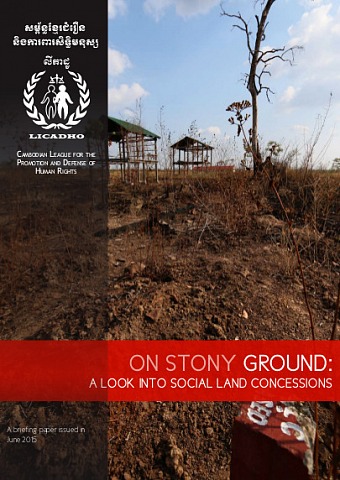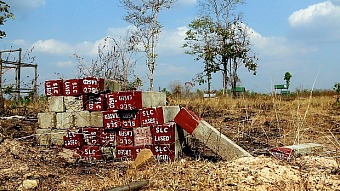On Stony Ground: A Look into Social Land Concessions
Published on 24 June 2015State-involved land conflicts have been one of the largest causes of human rights abuses in Cambodia for over a decade. Many of these abuses arose from disputes involving Economic Land Concessions (ELCs) and other land concessions awarded to private companies. On the eve of this great Cambodian land giveaway, in March 2003, the Cambodian government unveiled a potentially progressive land policy with the aim of transferring land to landless and poor Cambodians – Social Land Concessions (SLCs).
LICADHO recently investigated a $13 million SLC project, supported by the World Bank and the German development agency GIZ (Deutsche Gesellschaft für Internationale Zusammenarbeit), to assess whether the project has in fact benefitted rural poor Cambodians, as stated in both agencies' project reporting narratives.
“We found not only is the government’s lack of will to provide suitable land for poor Cambodians obvious but it appears that the donors have been more than willing to embellish results, claiming the project as a successful model for future replication” said Naly Pilorge, Director of LICADHO
The Land Allocation for Social and Economic Development (LASED) project began in 2008 and was intended to prove that SLCs could contribute to reducing rural poverty by transferring land to 3,000 landless Cambodian families for residential and farming purposes. The project was implemented with little public oversight and the narrative by World Bank and GIZ is overwhelmingly positive.
In the latest World Bank LASED Status Report, the World Bank described the project as a full success in terms of achievements and implementation progress, with key results even exceeding the planned targets. Meanwhile, the GIZ describes the achievements of LASED as a “cost-efficient replicable model guaranteeing significant positive impact on rural livelihoods [which] is now available for nationwide dissemination and up-scaling.”
In sharp contrast, LICADHO estimates that less than 50% of the families that received residential land in the LASED SLC sites had settled and remained at those sites at the time of LICADHO’s visits. Half of the SLC sites were not yet functional and will need substantial financial and technical support to be minimally sustainable. Numerous villagers reported limited ability to use the allocated agricultural plots and had gained no significant improvement in terms of food security. The land allocated by Cambodian authorities appears to be – at least in part – simply not suitable for agricultural purposes.
The Cambodian government’s lack of political will to ensure the success of these social land concessions is further exemplified by the fact that no land titles have been given to the SLC recipients who have met all the legal requirements, despite their frequent requests. Furthermore, many more families who received land may lose their property rights as poor implementation of the project effectively forces them to violate the legal requirements that they must satisfy to apply for the land title. And yet, the World Bank claims that “security of land tenure is considered the biggest benefit derived from the project.”
“The World Bank and GIZ cannot continue to deceive the public and other stakeholders,” said Ms. Pilorge. “Fundamental problems undermining the project, particularly the Cambodian government’s lack of political will, must be addressed for these SLCs to have any chance of success and sustainability. Addressing these problems must begin with acknowledging them, otherwise the agencies risk re-enforcing the government's bad behavior.”
Whilst the World Bank and GIZ publicly celebrate LASED’s successes, they are seemingly well aware that millions of dollars in additional investments are needed to address six years of shortcomings and failures. In late 2014, the World Bank announced a possible re-engagement in Cambodia through a new $25 million loan to continue funding 15 SLC sites, including the eight LASED sites. If approved, this will be the World Bank’s first new loan since suspending funding to Cambodia in 2011. This funding will be provided in addition to a food security follow-up project already initiated by GIZ.
LICADHO agrees that additional support is necessary to meet the promises of reduced poverty and increased food security for many of the families supported by LASED. However, a project that demands such high investment over so many years cannot be considered a replicable model for future SLC initiatives. Before donors provide additional money into more SLC projects, hard conclusions must be drawn about LASED’s failed model and the government’s inimical approach to social land concessions must be challenged.
For more information, please contact:
▪ Ms. Naly Pilorge, Director of LICADHO, 012 803 650
▪ Mr. Am Sam Ath, Technical Coordinator of LICADHO, 012 327 770
PDF: Download full statement in English - Download full statement in Khmer
MP3: Listen to audio version in Khmer
- Topics
- Land Rights










